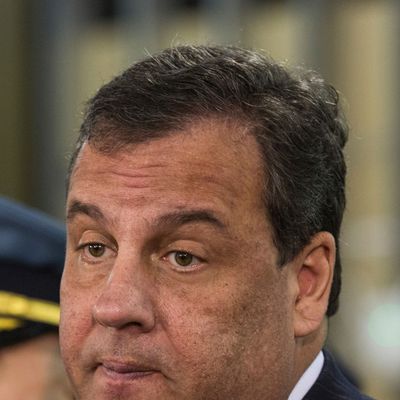
The New York Times reports that David Wildstein, the Port Authority official who oversaw punitive lane closings at the George Washington Bridge, had evidence that Chris Christie knew about it. The Times quickly changed its wording to reflect that fact that Wildstein merely says “evidence exists” that Christie knew.
The wording change prompted a familiar Chinese fire drill of reporters, after having rushed to proclaim Christie’s political demise, to mock the Times and caution that Christie may survive this yet. And he might! Sometimes people who appear very guilty turn out to be innocent. (See: Saddam Hussein and weapons of mass destruction.) But usually, people who appear very guilty turn out to be guilty. And Christie appears very guilty.
1. Wildstein is claiming evidence exists that Christie knew. He would look bad if such evidence does not come to light.
2. Wildstein spent time with Christie while the lanes were closed. If you had been ordered to close traffic lines for punitive reasons, and you saw the governor, wouldn’t you either tell him about it, or else already know he approved? Undertaking an action like that without knowing the governor approved it, and without having any desire to take credit, seems like an implausible motivation.
3. Christie has changed his story about when he knew about the lane closings. Having first asserted he learned on October 1, Christie later claimed he learned earlier, though would not say when.
4. His campaign manager is pleading the fifth.
5. Carrying out petty retribution is fully in keeping with the pattern of Christie’s governing style of using petty retribution.
6. Hell, allegations of abuse of power predate even his governorship. I keep mentioning the report in John Heilemann and Mark Halperin’s campaign book about the Romney campaign vetting of Christie, because I find it mystifying that others aren’t taking it as seriously as I am. It’s not that partisan enemies are ginning up accusations. Republican Mitt Romney wanted to nominate Christie, but took a look at the vetting file and ran the other way:
More than once, Myers reported back that Trenton’s response was, in effect, Why do we need to give you that piece of information? Myers told her team, We have to assume if they’re not answering, it’s because the answer is bad.
The vetters were stunned by the garish controversies lurking in the shadows of his record. There was a 2010 Department of Justice inspector general’s investigation of Christie’s spending patterns in his job prior to the governorship, which criticized him for being “the U.S. attorney who most often exceeded the government [travel expense] rate without adequate justification” and for offering “insufficient, inaccurate, or no justification” for stays at swank hotels like the Four Seasons. There was the fact that Christie worked as a lobbyist on behalf of the Securities Industry Association at a time when Bernie Madoff was a senior SIA official—and sought an exemption from New Jersey’s Consumer Fraud Act. There was Christie’s decision to steer hefty government contracts to donors and political allies like former Attorney General John Ashcroft, which sparked a congressional hearing. There was a defamation lawsuit brought against Christie arising out of his successful 1994 run to oust an incumbent in a local Garden State race. Then there was Todd Christie, the Governor’s brother, who in 2008 agreed to a settlement of civil charges by the Securities and Exchange Commission in which he acknowledged making “hundreds of trades in which customers had been systematically overcharged.” (Todd also oversaw a family foundation whose activities and purpose raised eyebrows among the vetters.)
Everything here is circumstantial. Christie definitely comes off as the kind of politician who would order a stunt like this. Possibly he didn’t do it. Possibly he did, but it will never be proven. His best-case scenario now appears to be an absence of a smoking gun, and convincing voters not to believe the subordinate pointing a finger at him. It doesn’t look good.






























